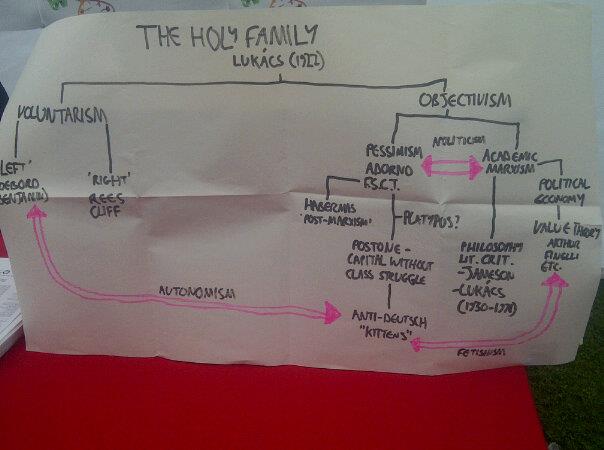A discussion of the relation of Keynesianism, social-democratic politics and Marxism to the purported decline of the U.S. as global hegemonic state, beginning in the 1970s and continuing in "Left" discourse to the present held on June 14th, 2014 at the School of the Art Institute of Chicago. Teach-in led by Chris Cutrone.
Readings for discussion:
Platypus Historians Group, Friedrich Hayek and the legacy of Milton Friedman: Neo-liberalism and the question of freedom (In part, a response to Naomi Klein) (2008)
Robert Lekachman, Capitalism for Beginners (1981)
Michael Harrington, "Marxism and democracy" Praxis International 1.1 (1981)
A panel held on April 5th, 2014 at the Sixth Annual Platypus International Convention at the School of the Art Institute of Chicago.
Panelists:
Chris Cutrone (Platypus)
Samir Gandesha (Simon Fraser University)
Nikos Malliaris (Lieux Communs)
Dimitrios Roussopoulos (Transnational Institute of Social Ecology)
Joseph Schwartz (Temple University)
Description:
“No coarser insult, no baser defamation, can be thrown against the workers than the remark, ‘Theoretical controversies are for the intellectuals’“
— Rosa Luxemburg, Reform and Revolution (1900)
“Since there can be no talk of an independent ideology formulated by the working masses themselves in the process of their movement the only choice is — either bourgeois or socialist ideology… This does not mean, of course, that the workers have no part in creating such an ideology. They take part, however, not as workers, but as socialist theoreticians, as Proudhons and Weitlings; in other words, they take part only when they are able, and to the extent that they are able, more or less, to acquire the knowledge of their age and develop that knowledge.“
— Vladimir Lenin, What is to be Done? (1905)
"The liquidation of theory by dogmatization and thought taboos contributed to the bad practice."
— Adorno, Negative Dialectics (1966)
This discussion will reflect on the relationship between revolutionary politics and thinking in the past and present and ask why has it become increasingly difficult to render political life intellectual and intellectual life political today? Panelists will consider the historical role of revolutionary theory as a moment of revolutionary politics, and the ways in which thinking can be held responsible for politics, and politics held responsible for thinking.
A Platypus-wide teach-in on the CPGB’s campaign against Lukacs and its stakes for Platypus as a project.
Held on Saturday January 11 1-4PM at the School of the Art Institute of Chicago 112 S. Michigan Ave. room 920 while simultaneously broadcast internationally via Livestream.
James Turley's historical chart of Lukacs's influence on Platypus:

The preparatory readings for this event are as follows and can be found at:
- Mike Macnair, “The philosophy trap” 11/21/13
http://www.cpgb.org.uk/
- Chris Cutrone, “Defending Marxist Hegelianism against a Marxist critique” 8/11/11
http://www.cpgb.org.uk/
- Georg Lukacs, Original Preface (1922) to History and Class Consciousness (1923)
http://www.marxists.org/
CPGB contra Lukács
Communist Party of Great Britain (Provisional Central Committee)
contra Georg Lukács
James Turley, Chris Cutrone, Lawrence Parker
http://
Originally published in Weekly Worker January 24 – March 14, 2013. PDF:
http://
articles:
- James Turley, “The antinomies of Georg Lukács” 1/24/13
- Chris Cutrone, “Regression” 1/31/13
- James Turley, “Dummy” 2/21/13
- Chris Cutrone, “Nota bene” 2/28/13
- James Turley, “Bacon” 3/7/13
- Lawrence Parker, “Lukács reloaded” 3/7/13
- Chris Cutrone, “Unreloaded” 3/14/13
http://
Supplemental:
Chris Cutrone, “Gillian Rose’s ‘Hegelian’ critique of Marxism” 3/1/10
http://platypus1917.org/
A panel discussion held at Left Forum 2013, at Pace University, on June 9, 2013.
This panel was transcripted in Platypus Review #61 (Click on banner below to see):
Description:
Bourgeois society came into full recognition with Rousseau, who in the Discourse on the Origin of Inequality and On the Social Contract, opened its radical critique. Hegel wrote: "The principle of freedom dawned on the world in Rousseau." Marx quoted Rousseau favorably that "Whoever dares undertake to establish a people’s institutions must feel himself capable of changing, as it were, human nature... to take from man his own powers, and give him in exchange alien powers which he cannot employ without the help of other men." Rousseau posed the question of society, which Adorno wrote is a "concept of the Third Estate." Marx recognized the crisis of bourgeois society in the Industrial Revolution and workers' call for socialism. But proletarian socialism is no longer the rising force it was in Marx's time. So what remains of thinking the unrealized radicalism of bourgeois society without Marx? Kant stated that if the potential of bourgeois society was not fully achieved as the “mid-point” of freedom then Rousseau may have been right to prefer savagery against civilization’s “glittering misery.” Nietzsche warned that we might continue to be "living at the expense of the future:" "Perhaps more comfortably, less dangerously, but at the same time in a meaner style, more basely." How have thinkers of the revolutionary epoch after Rousseau, Adam Smith, Kant, Hegel, Benjamin Constant, and Nietzsche himself, contributed to the possibility of emancipation in a world after Marxism?
Speakers:
Chris Cutrone
Spencer Leonard
Sunit Singh


